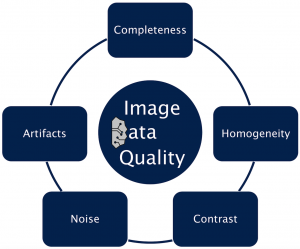Automated digital analysis of data quality

In this research area, the quantitative analysis of data quality for magnetic resonance imaging (MRI) data is conducted. Quality control is an essential – yet often neglected – task, to exclude data of poor quality before further processing and to avoid statistical bias in the analysis. Visual inspection is very subjective as well as time consuming and therefore, impractical for large-scale studies. The goal of this research area is to use and extent already established methods for analyzing data quality.
To this end, DICOM data are formatted according to the “Brain Imaging Data Structure” (BIDS) by using predefined rulesets. Subsequently, the quality is analyzed with MRIQC – an open-source toolbox that automatically determines various metrics to assess data quality. The quality metrics can be divided into four categories and are applied on T1- as well as T2-weighted and BOLD-data. In the first category belong metrics that characterize the impact of noise. The second category comprises measures based on information theory to evaluate the spatial distribution of information, while the third includes measures targeting specific artifacts. In the last category belong all metrics not fitting into any of the other groups. Based on these measures, quality reports are generated automatically per subject and across groups. They facilitate comparability and therefore, swift evaluation of the quality.
By means of these quality reports and a quantitative analysis of as many as possible heterogeneous imaging data, minimum requirements on MRI data are defined in the research are on comparable results from non-standardized data acquisition. Outliers can be possibly corrected with methods to improve the data quality, to meet these minimum requirements. Lastly, these quality reports serve as quantitative measure to include data of high quality only for training of neural networks and for the extraction of features. Furthermore, within this research area the already established metrics are extended, for example to assess the quality of “Diffusion Tensor Imaging” (DTI) data.





